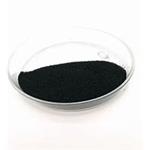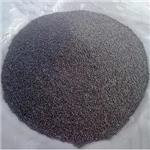Uses of Cobalt
Jan 11,2022
Cobalt was discovered by George Brandt in 1737. Cobalt exists in valence states from 0 to 5, with the most stable (+2 and +3) being the most common. Although there is only one stable isotope of cobalt, there are a number of unstable isotopes. Two of these, cobalt-60 and cobalt-57, are in use commercially. Cobalt-60 is used for cancer treatment and food irradiation. Cobalt-57 has research applications.

Uses
Cobalt is a relatively rare metal produced primarily as a byproduct of the mining of other metals, chiefly copper. It is the essential trace element found in cyanocobalamin (vitamin B12). This vitamin protects against pernicious anemia and is required in the production of red blood cells. Medicinally, cobalt salts have been used to stimulate the formation of red blood cells in individuals suffering from anemia.
Commercially, cobalt is used primarily in high temperature
alloys, tungsten carbide tools, and (with iron and nickel)
permanent magnets. Cobalt salts are used in pigments and
paint dryers and as catalysts in the petroleum industry.
Environmental Fate
The sources of cobalt in the environment are both natural and synthetic (anthropogenic). Natural sources include soil, seawater spray, volcanic eruptions, and forest fires. Anthropogenic sources include combustion of fossil fuels, metal smelting, sewage sludge, and processing of cobalt alloys. Cobalt is found in the atmosphere in particulate form and returns to the Earth’s surface through dry deposition and with rain or snow. Once in surface water, cobalt generally moves into sediment. Cobalt does not appear to biomagnify significantly in the aquatic food chain. The cobalt that does accumulate in fish is largely found in the nonedible parts of the fish. Seventy-nine percent of the cobalt is transported by rivers globally and precipitates in estuaries.
Under normal environmental conditions, cobalt is expected to bind strongly to soil; thus, migration through soil is very limited. Cobalt in soil can be taken up by plant roots and root vegetables, but does not translocate to the aboveground parts of plants.
Mechanism
Cobalt most often depresses the activity of enzymes, including
catalase, amino levulinic acid synthetase, and P-450, enzymes
involved in cellular respiration. The Krebs citric acid cycle can
be blocked by cobalt resulting in the inhibition of cellular
energy production. Cobalt can replace zinc in a number of zincrequired
enzymes such as alcohol dehydrogenase. Cobalt can
also enhance the kinetics of some enzymes, such as heme
oxidase in the liver. Cobalt interferes with and depresses iodine
metabolism, resulting in reduced thyroid activity. Reduced
thyroid activity can lead to goiter.
- Related articles
- Related Qustion
- Cobalt and Flame Test Jan 26, 2024
Cobalt is a lustrous very hard silvery metal belonging to a group called the "transition metals". It is always used in flame test, to eliminate the effects of sodium.
- Cobalt: Sources of Exposure & Medical Management Mar 6, 2020
Cobalt (Co; CASRN 7440-48-4) is a silvery-gray brittle but hard metal, which is distributed widely in nature, including rocks, soil, plants, and animals. It is a metal with no odor and no vapor pressure at room temperature.
Coal tar is a complex hydrocarbon mixture produced by thermal destruction (pyrolysis) of coal, typically a dark viscous liquid or semisolid with a smoky or naphthenic odor. The composition of coal tar will be influenced by the process used....
Jan 11,2022Organic ChemistryColchicine is obtained from the autumn crocus, Colchicum autumnale, or the glory lily, Gloriosa superba.Descriptions regarding use of Colchicum autumnale (meadow saffron) for swelling and types of inflammatory arthritis date back to the fir....
Jan 11,2022Biochemical EngineeringCobalt
7440-48-4You may like
- Rhenium:Discovery,Minerals,Chemistry,Uses,Toxicity
May 31, 2024
- How are Lead Minerals Distributed?
May 31, 2024
- Discovery and Major Minerals of Bismuth
May 31, 2024
- Cobalt
-

- $6.00 / 1KG
- 2024-05-30
- CAS:7440-48-4
- Min. Order: 1KG
- Purity: 99%
- Supply Ability: 20TONS
- Cobalt
-

- $6.00 / 1KG
- 2024-04-12
- CAS:7440-48-4
- Min. Order: 1KG
- Purity: MORE THAN 99%
- Supply Ability: 20000KG/MONTH
- Cobalt
-

- $0.00 / 1kg
- 2023-12-25
- CAS:7440-48-4
- Min. Order: 1kg
- Purity: 99.9%
- Supply Ability: 1000000




